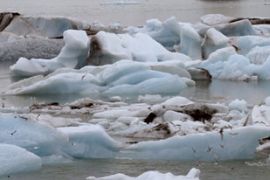US ‘serious’ on climate change
Conference of world’s 16 biggest polluters is opened by US secretary of state.

Significant meet
The conference, chaired by Rice, is being attended by representatives from leading industrial and emerging economies, the United Nations and European Union.
Four more meetings will be held in 2008, culminating “tentatively” in a leaders’ summit.
The 16 nations taking part are Australia, Britain, Brazil, Canada, China, France, Germany, India, Indonesia, Italy, Japan, South Korea, Mexico, Russia, South Africa and the United States, which together account for more than 90 per cent of global greenhouse gas emissions.
Other participants are Portugal, as current EU president, and officials from the UN Framework Convention on Climate Change (UNFCCC).
Rice pledged the aim of the Washington talks was to “accelerate the broader process under the UNFCCC”.
“We want this year’s climate change conference in Indonesia to succeed,” she added.
Emissions cap
Key talks under the UNFCCC take place in Bali, Indonesia, from December 3-14, aimed at setting out a timetable for negotiations to restrict carbon gas after 2012, when current commitments under Kyoto Protocol run out.
The core of any UNFCCC deal will be a mandatory cap on emissions by rich countries, a principle that Bush has fiercely opposed since 2001.
At a UN summit on climate change on Monday, Rajendra Pachauri, the chairman of the Intergovernmental Panel on Climate Change (IPCC), warned the crisis was accelerating.
Glaciers and Arctic sea ice were retreating rapidly and “major precipitation changes” – droughts and floods – were occurring, according to the UN’s top scientific panel on climate change.
On present trends hundreds of millions of people faced worsening water scarcity as a result of glacier loss in the Himalayas, which fed key rivers in China and South Asia.
Water scarcity would affect the growing of key crops.